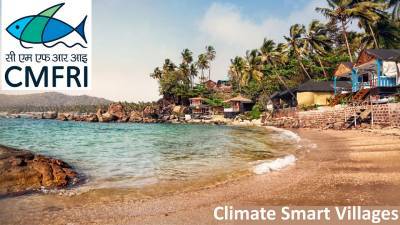Water clinics; AI and satellite remote sensing-based prediction of harvest to address inter-annual fluctuations; species distribution models; exploration of untapped deep-sea resources are some of other smart solutions from CMFRI
KOCHI, 22 October 2023: In view of a barrage of challenges from flooding to shoreline changes to disease outbreaks posing serious threat to the coastal lives, the ICAR-Central Marine Fisheries Research Institute (CMFRI) has suggested climate smart villages to check the risks in the region.
The institute is prioritising the development of climate smart villages by providing training and resources to coastal fishers and farmers in vulnerable villages to help them adapt to the climate crisis, according to a CMFRI report.
The report was presented at the global conclave on mainstreaming climate change into international fisheries governance organised under the leadership of the Food and Agriculture Organisation (FAO) in collaboration with the Department of Fisheries, Govt of India and the Bay of Bengal Programme Inter-Governmental Organisation (BOBP) from Oct 17 to 19 in Chennai.
The report pointed out that increased frequency of cyclones, subsequent storm surges and coastal flooding are causing social and economic hardship among the coastal communities, making them the most vulnerable to climate emergency.
“Tropical cyclones, floods, excess rainfall and receding coastline have a cascading impact on fishers’ safety and livelihoods which leave the community with loss of income, loss of property, health problems and unemployment”, said Dr Grinson George, Head of the Marine Biodiversity Management and Environment Division of the CMFRI while presenting the report at the conclave. The report focused on India’s status of climate resilience initiatives in the marine fisheries sector.
Water Clinics to tackle disease outbreaks
CMFRI also suggested water clinics to address the increasing cases of disease outbreaks in the coastal region. “Waterborne diseases are on the rise in coastal areas owing to storm surges and flooding” Dr George said, adding that the rising sea surface temperatures (SST) aggravates the issue as it contributes to an increased microbial load in the waters. “This poses a looming threat to human health along the coastal belt. Proper testing of the water quality and community awareness are some of the possible solutions to address the issue and the proposed water clinics are aimed in this direction, he added.
Smart Solutions
CMFRI also proposed a slew of smart solutions including Integrated Multi-trophic Aquaculture (IMTA), seaweed farming, mangrove forestation and other adaptation and mitigation measures to safeguard fishers. In addition, it suggested AI and satellite remote sensing in the estimation and prediction of marine harvest so that climate based inter-annual fluctuations can be addressed. Developing suitable species distribution models will help assess multi-species stocks in tropical climate challenged contexts.
Untapped Deep-Sea Resources
In order to boost marine capture fisheries sector, unconventional and untapped deep-sea resources such as oceanic squid, oceanic tuna, tuna like fishes and mesopelagic fishes could be explored, CMFRI suggested.
Image credit: english.metrovaartha.com
By Jagdish Kumar




















